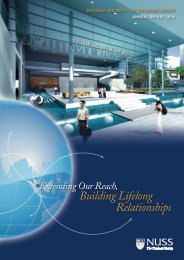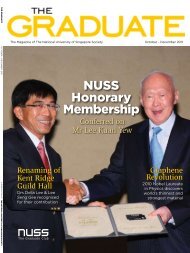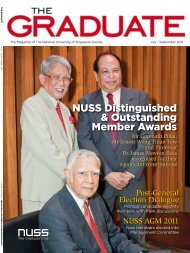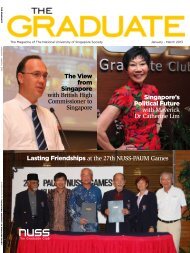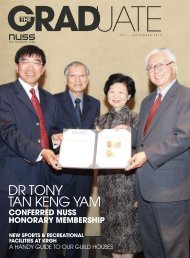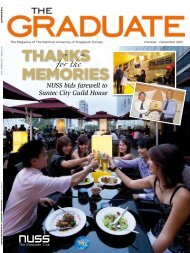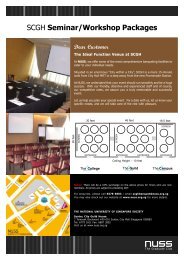Ben Cao GanG Mu - NUSS
Ben Cao GanG Mu - NUSS
Ben Cao GanG Mu - NUSS
You also want an ePaper? Increase the reach of your titles
YUMPU automatically turns print PDFs into web optimized ePapers that Google loves.
inside<br />
sTory<br />
0<br />
Practitioner is Key<br />
Undeniably, the practitioner plays a pivotal role in ensuring<br />
that the ailment is diagnosed correctly and that the treatment<br />
endorsed is appropriate. At this juncture, although TCM<br />
training courses are aplenty in China, few of them are<br />
accredited. To complicate matters, the training duration of the<br />
practitioners vary from months to years.<br />
The Risk of Allergy<br />
As TCM usually involves the consumption of herbal medicine,<br />
that are made up of a concoction of different elements within<br />
the herb, it is hard for patients to ascertain the exact harm<br />
that might result. In some mild instances, the patient would<br />
experience allergy; in some severe cases, this could mean<br />
poisoning. This necessitates consultation with a trained<br />
person prior to dispensing medication.<br />
Lack of Standardisation<br />
Chinese herbal medication are often not standardised from<br />
one pill to the next, or from one brand to the next, and<br />
can be reformulated, remixed, or altered by any company.<br />
Essentially, this means the same dosage for one brand may<br />
be heavier compared to the other. Consequently, it makes<br />
the effectiveness of Chinese medication unpredictable.<br />
Regulating TCM<br />
Due to nagging safety issues and incidents of herb abuse,<br />
governments and health organisations are recognising<br />
the need to regulate the industry. The Traditional Chinese<br />
Medicine Practitioners Act passed on 14 November 2000<br />
provides such a form of regulation for the industry.<br />
The Act stated that practitioners of TCM must register with<br />
the TCM Practitioners Board, and with effect from 2004,<br />
registered practitioners must also possess valid practising<br />
certificates. (For a listing of registered TCM practitioners, visit<br />
www.tcmpb.gov.sg)<br />
Along with recognition and the installation of proper<br />
accreditation guidelines, the stature accorded to TCM<br />
industry and the practitioners are now elevated. Having<br />
a governing body and an accredited degree programme<br />
ensure that the practitioners will have a uniform standard of<br />
practice. Implicitly, this provides a platform for faster growth<br />
and maturity of the industry.<br />
That said, while regulations and accreditation provide the<br />
launchpad, it is really the research discoveries and equipping<br />
practitioners with the appropriate knowledge that will propel<br />
the industry forward.<br />
Currently, TCM training is provided at three different colleges<br />
in Singapore, the Singapore College of Traditional Chinese<br />
Medicine, Institute of Chinese Medical Studies and the<br />
Nanyang Technological University (NTU).<br />
Although the degree offered in NTU is not a specialised<br />
one, but a double degree in Bachelor of Science (Hons) in<br />
Biomedical Sciences and Medicine (Chinese Medicine), it is<br />
momentous to have a government affiliated university, offer a<br />
TCM-related course. This signifies the acceptance of TCM.<br />
With Singapore poised to be a biomedical hub and medical<br />
tourism hotspot, the prospects of moving the industry one<br />
step closer to being a reliable source of treatment worldwide<br />
is slowly but surely manifesting.<br />
Shifting Perceptions<br />
This one small step is part of a paradigm shift of perceptions<br />
in the medical industry. The Westernised world used to be<br />
bounded by the limitations of technological advancements<br />
and the speed of laboratory discoveries – a signature of<br />
Western medicine. With the growing acceptance of TCM as<br />
a legitimate treatment method, a rich plethora of possibilities<br />
have been unearthed.<br />
In its infancy, Singapore’s medical industry is looking at TCM<br />
as complementary treatment. Judging from Hong Kong and<br />
Taiwan’s medical industry, which are ahead of Singapore in its<br />
adoption of TCM treatments, TCM is set to be fully integrated<br />
with Western Medicine in the very near future.<br />
Certainly, the future seems to be bright for TCM practitioners<br />
as it evolves to encompass a more research-grounded<br />
industry. Perhaps soon, a new reference will be coined in<br />
place of ‘Traditional Chinese Medicine’ to better represent it.



